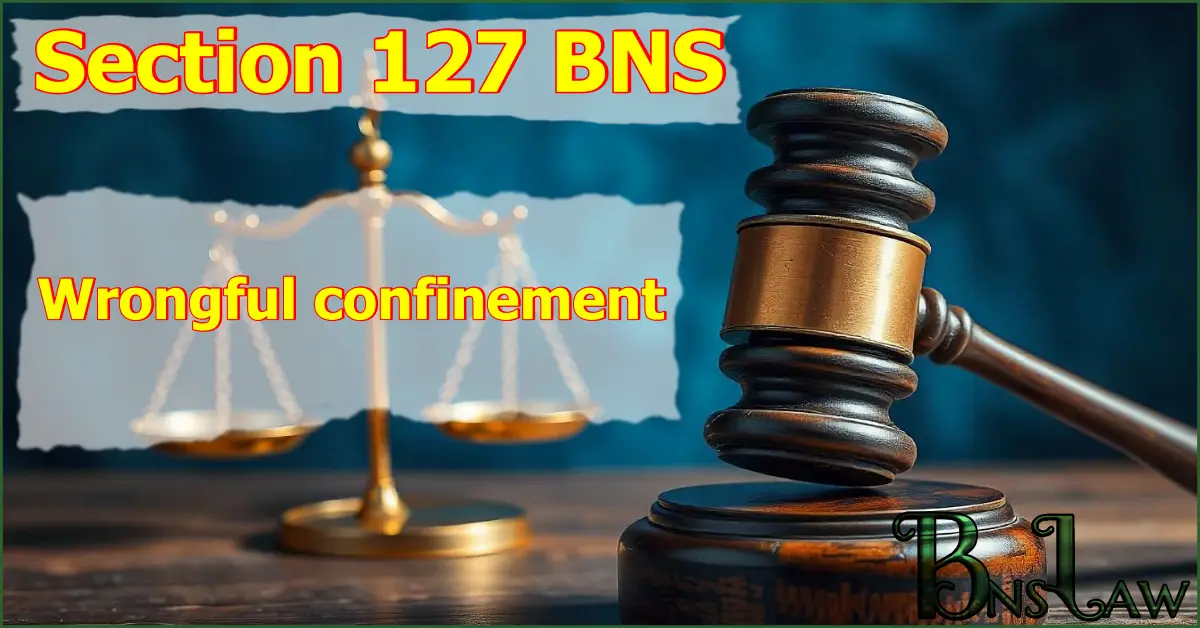Section 127 BNS | BNS 127 | Wrongful Confinement Section
127(1) BNS | Wrongful Confinement Meaning
Whoever wrongfully restrains any person in such a manner as to prevent that person from proceedings beyond certain circumscribing limits, is said “wrongfully to confine” that person.
Illustrations
(a) A causes Z to go within a walled space, and locks Z in. Z is thus prevented from proceeding in any direction beyond the circumscribing line of wall. A wrongfully confines Z.
(b) A places men with firearms at the outlets of a building, and tells Z that they will fire at Z if Z attempts to leave the building. A wrongfully confines Z.
127(2) BNS
Whoever wrongfully confines any person shall be punished with imprisonment of either description for a term which may extend to one year, or with fine which may extend to five thousand rupees, or with both.
127(3)BNS
Whoever wrongfully confines any person for three days, or more, shall be punished with imprisonment of either description for a term which may extend to three years, or with fine which may extend to ten thousand rupees, or with both.
127(4)BNS
Whoever wrongfully confines any person for ten days or more, shall be punished with imprisonment of either description for a term which may extend to five years, and shall also be liable to fine which shall not be less than ten thousand rupees.
127(5)BNS
Whoever keeps any person in wrongful confinement, knowing that a writ for the liberation of that person has been duly issued, shall be punished with imprisonment of either description for a term which may extend to two years in addition to any term of imprisonment to which he may be liable under any other section of this Chapter and shall also be liable to fine.
127(6) BNS
Whoever wrongfully confines any person in such manner as to indicate an intention that the confinement of such person may not be known to any person interested in the person so confined, or to any public servant, or that the place of such confinement may not be known to or discovered by any such person or public servant as hereinbefore mentioned, shall be punished with imprisonment of either description for a term which may extend to three years in addition to any other punishment to which he may be liable for such wrongful confinement and shall also be liable to fine.
127(7) BNS
Whoever wrongfully confines any person for the purpose of extorting from the person confined, or from any person interested in the person confined, any property or valuable security or of constraining the person confined or any person interested in such person to do anything illegal or to give any information which may facilitate the commission of an offence, shall be punished with imprisonment of either description for a term which may extend to three years, and shall also be liable to fine.
127(8) BNS
Whoever wrongfully confines any person for the purpose of extorting from the person confined or any person interested in the person confined any confession or any information which may lead to the detection of an offence or misconduct, or for the purpose of constraining the person confined or any person interested in the person confined to restore or to cause the restoration of any property or valuable security or to satisfy any claim or demand, or to give information which may lead to the restoration of any property or valuable security, shall be punished with imprisonment of either description for a term which may extend to three years, and shall also be liable to fine. Of criminal force and assault.
READ OTHER SECTIONS OF CHAPTER VI — OF OFFENCES AFFECTING THE HUMAN BODY
FAQs of BNS Section 127
-
127 BNS punishment and fine
Punishment and fine under Section 127 of the BNS—
127(2): Imprisonment for 1 year, or fine of 5,000 rupees, or both.
127(3): Imprisonment for 3 years, or fine of 10,000 rupees, or both.
127(4): Imprisonment for 5 years and fine of 10,000 rupees.
127(5): Imprisonment for 2 years in addition to any term of imprisonment to under any other section and fine.
127(6): Imprisonment for 3 years in addition to other punishment which he is liable to and fine.
127(7): imprisonment for 3 years and fine.
127(8): Imprisonment for 3 years and fine. -
127 BNS cognizable or not
Offences under all sub-sections of section 127 of BNS are cognizable.
-
127 BNS bailable or not
Offences under all sub-sections of section 127 of BNS are bailable except the offence under Section 127(4) which is non-bailable.
-
127 BNS trial court
Offence specified in Section 127(2), 127(3), 127(7) and 127(8) of the BNS is triable by Any Magistrate while the offence specified in Section 127(4), 127(5) and 127(6) is triable by the Magistrate of the first class.
Important Points
- Cognizable Offences: These are offences where a police officer can arrest a person without a warrant.
- Non-Cognizable Offences: These are offences where a police officer cannot arrest a person without a warrant.
- Bailable Offences: These are offences where the accused can get bail from the police station itself. All bailable offences are listed in the First Schedule of the Bharatiya Nagarik Suraksha Sanhita (BNSS).
- Non-Bailable Offences: Offences in which bail is not granted directly from the police station but after hearing the case in the court, the judge decides when bail will be granted. All non-bailable offences are listed in the first schedule of the Bharatiya Nagarik Suraksha Sanhita (BNSS).
- In the above FAQ, “trial court” means the court that has jurisdiction to try the offence.
- In the above FAQ, the expression “Magistrate of the first class” and “Any Magistrate” does not include Executive Magistrates.
Read other Sections of the BNS
Reference Link: New Criminal Laws (BNS), Ministry of Home Affairs







